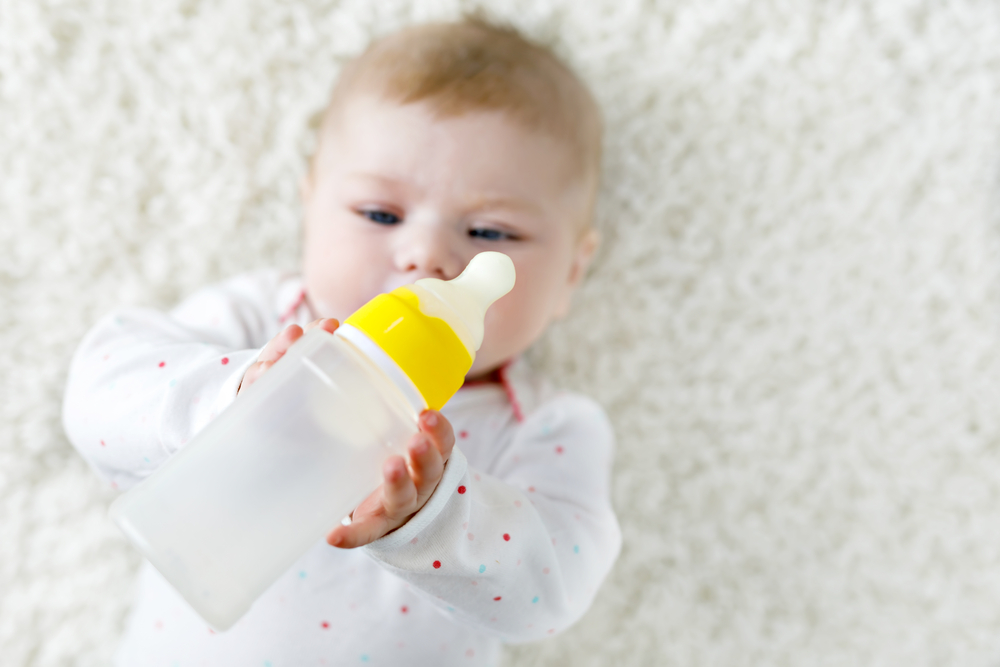Editor’s Note
As of May 2022, many formulas have become increasingly difficult to find. Please read our article, What To Do If You Can’t Find Baby Formula, for more information regarding the formula shortage.
One big question parents have when needing to change their baby’s diet is “how long will it take the baby to adjust to a formula change?”
While this can vary from infant to infant, most research shows that a baby will typically adjust to a new formula in up to 10 days, but you’ll need to monitor your own baby carefully.
As always, when making decisions regarding your baby’s formula, consult your pediatrician. If you have any questions or concerns a pediatrician is a knowledgeable resource that you should feel comfortable consulting regularly.
Switching Formulas – How Long Does it Take Baby to Adjust?
Determining how long it will take baby to adjust to a formula change is hard. There is no perfect answer to this question, but typically you should anticipate an adjustment period of about one to two weeks.
If you are switching between similar formulas, for example, powdered versus liquid of the same brand, there may be no adjustment period. If you’re switching formula due to an allergy, for example switching from cow’s milk to soy-based, it may take longer for a baby to fully adjust to new ingredients.
Depending on your reasoning for switching formulas, we recommend waiting at least 2 weeks in between changes so that your little one’s stomach does not go through too much turmoil.
What to Expect When Changing Formula
Babies are not able to tell us their preference or how they are feeling with words. It is important to look for signs. Your baby may accept a new formula without any trouble and adjust fairly quickly. However, we still recommend that you monitor them for a couple of weeks to make sure that they are fully adjusted.
If your baby does not readily accept a bottle of new formula, all hope is not lost! Try starting with a bottle when you know baby is happy and not starving, they may be more receptive to trying something new. You can even mix in a small amount of new formula to your current formula so that baby barely notices the change.
Some adverse effects of diet change may be temporary as a baby adjusts to new ingredients and nutrients. While they are not necessarily something to be concerned about, we recommend that you keep track of what you are noticing. If they have not improved within 3-5 days, consult your pediatrician.
Write Down What You Notice
Our best recommendation is to jot down what’s happening. We know that tired mom brains can’t keep track of it all! Keep a running list of how often your baby is eating and how much, any side effects such as gassiness, stool changes, how they are sleeping, etc. There may be slight changes happening that you’re not aware of while in the thick of figuring out life with a baby.
Babies can be unpredictable, and not all changes are tied to food! While you might notice your baby is extra fussy, this could be teething or a developmental leap. Writing down what you’re noticing can help you find patterns and determine whether or not they are connected to formula.
Don’t give up too easily, and look at the whole picture before making constant switches.
Keep Connected with Your Pediatrician
We can’t stress enough how important it is to stay connected with your pediatrician. You may feel like a bother, but it’s important to remember that they are there to help you! Rather than feeling like you are burdening a pediatrician with your concerns or questions, think of it as a partnership. You are working together to determine what is best for your child.
As you start the switch to a new formula, keep your list of what you notice. When you regularly connect with your pediatrician you can go over what you have noticed without feeling like you have missed any vital information. Following your parent’s intuition, with the guidance of a medical professional, you will easily be able to make the right decisions.
Don’t Give Up
As with many parts of parenting, figuring out the right formula for your baby may feel like a daunting task. It can feel like a lifetime when you’re living with a gassy or fussy baby, but it won’t always be like that. Give yourself grace and try to have patience as your baby adjusts to their new formula.
If your child is taking a little longer to adjust to a formula change, stay positive and soothe them as best as you are able. The end goal is a happy, well-fed baby, which is worth the transition to a new formula.
Steps to Switching Formula
1. Choose Your Formula
There are all kinds of formulas available, and choosing the right one might feel overwhelming. First, determine what you are looking for in terms of ingredients. This could be a decision between cows milk or soy, specialized formulas for allergies, added prebiotics, or additional vitamins.
These days most formulas have a very similar makeup to breast milk and provide all of the appropriate nutrients your baby will need. Ingredients like DHA, Inositol, Vitamin D, and Prebiotics are important ingredients you may not know are available in formulas, so research each brand and label before giving to your baby.
Other things to keep in mind are preference choices. This could be things like powder, liquid, organic, accessibility, and cost. You may find that your baby has a preference for one formula over another, so we don’t recommend stocking up too much until you know what will work best.
2. Determine Your Schedule
If you are changing formula due to an allergy or intolerance, switching all at once is perfectly acceptable. You should notice improvements right away, and your doctor will likely let you know what signs to look out for.
If you are changing formula due to baby’s preference, better ingredients, choosing to go organic, etc, then you may choose to go with a more gradual method. A gradual transition should take about 4 days to completely switch to a new formula. Start by introducing one bottle of new formula a day. Increase by one feeding each day until you have fully made the switch to your new formula.
Once you have fully switched over to your new formula, then begin monitoring your baby for up to two weeks to make sure they have fully adjusted. When determining how long it will take baby to adjust to a formula change, you should start from when they are fully on that new formula.
3. Watch for Side Effects
Some common side effects that you can anticipate when transitioning your baby to a new formula are:
- Fussiness
- Change in stools (like constipation or diarrhea)
- Spitting up
- Gas
- Wanting to eat more or less often
Some babies won’t experience any of these side effects, and some will experience them all. If you are noticing side effects, we recommended waiting 3-5 days after introducing a new formula to see if they improve.
If you see anything like a rash, hives, or severe vomiting, this could be an indication of an allergy. Consult your pediatrician and stop the use of the new formula immediately.
Try to remember that some common side effects, like fussiness and wanting to eat more often may not be tied to the change in formula. As your baby grows and develops, you will learn what their preferences are and what ties back to their development versus formula effects.
Powdered Versus Liquid Formula
When questioning how long does it take for baby to adjust to a formula change, you might wonder if the form of formula plays a factor. Most formulas come in three different forms: powdered, liquid concentrate, or ready-to-use liquid.
Typically powdered formula is the least inexpensive, with ready-to-use being the most expensive. However, paying for convenience can be worth it. But will it affect the transition?
There is no evidence to indicate that either form is easier to digest. This means you can still anticipate the same adjustment period for both powdered and liquid formulas.
Recommended Baby Formulas
The two most popular brands in the country are currently Enfamil and Similac. Each offers multiple options for formula that are tested and approved by many parents and pediatricians. For a full breakdown of these and other brands, plus our number one recommendation, check out our article on which is the best baby formula.
There is no reason that you need to go with a name brand formula. Most store-brand formulas have almost identical ingredient lists. When doing your research, take a look at ingredients and compare the two.
Currently, there is no research to indicate that a baby will adjust quicker to one formula versus another. When determining how long it will take your baby to fully adjust to a formula change, the brand won’t necessarily play a factor.
FAQs About Switching Baby Formula
How do you know if you need to change your baby’s formula?
There are many reasons for needing to switch formulas.
If your baby has an allergy or intolerance, a pediatrician will make a recommendation for a new formula based on your baby’s needs. If your baby refuses bottles and is not getting enough intake, then it might be time to try a new formula as well. Other indicators that it might be time for a formula change are digestion issues or vitamin deficiencies.
There are other reasons for wanting to change a baby’s formula that doesn’t have to do with baby. Perhaps as parents, you are looking to switch to a more organic choice, or cost plays a factor. Whatever the reason may be, we don’t recommend making too many abrupt changes quickly, and giving your baby at least a full two weeks to adjust in between changes.
How do I know my baby has adjusted?
Always monitor your baby’s intake and diapers. If your baby is taking full feedings, has plenty of wet diapers, regular bowel movements, and no major side effects, they have likely adjusted just fine. It’s hard when babies can’t tell us how they feel, but you can watch them for clues they are doing fine.
Can switching formula hurt my baby?
Switching formula should not have any negative effects on your baby. If you’re switching between similar formulas, there may not even be any adjusting for baby to do. Switching between cow’s milk to soy will likely have the biggest adjustment, but should not be harmful to your baby. As always, if you have any concerns, consult your child’s pediatrician.
What are signs a new formula doesn’t agree with my baby?
Any signs of an allergy, such as rash, hives, or severe vomiting, should be immediately addressed with a pediatrician.
Other indicators might be prolonged loose stools, constipation, excessive gassiness, unusual fussiness, and bottle refusal. If you notice these side effects and they haven’t improved in 3-5 days consult your pediatrician. If they haven’t resolved in 10-14 days it might be time to consider another switch.
Final Thoughts
As parents, we want our babies to be fed and happy so that they can grow and thrive without issue. Knowing how to make the right formula choice can feel like a lot of pressure, but there’s an option out there for every kind of baby. When you notice that something doesn’t seem to be working right, it might be time for a change.
You might worry about how long it will take for baby to adjust to a formula change, but try not to worry. Most babies will adjust in just 3-10 days. Keep track of what you notice, and don’t hesitate to partner with your pediatrician for the best results.







